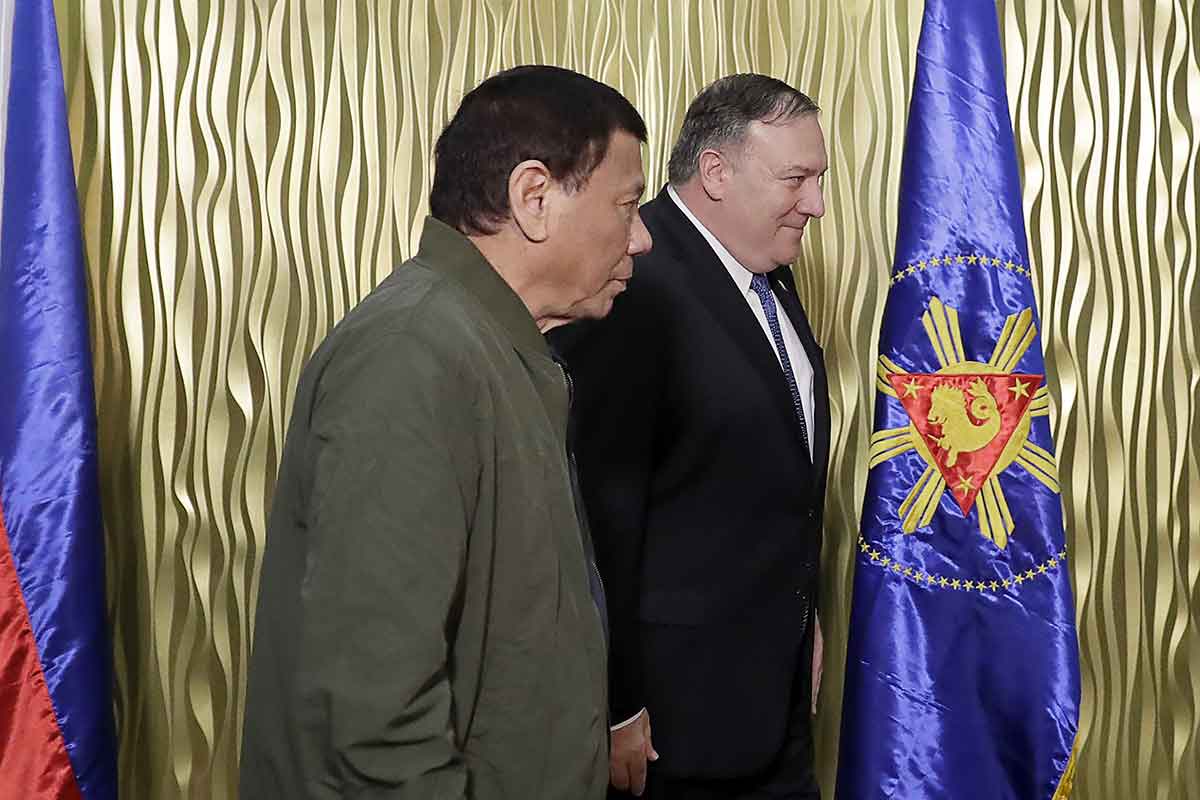United States (US) Secretary of State Mike Pompeo on Friday vowed to defend the Philippines against "armed attack" in the disputed South China Sea, in Washington's starkest warning yet against Chinese claims to most of the strategic waterway.
Speaking in Manila after meeting with Philippine President Rodrigo Duterte, Pompeo said Beijing's actions in waters also claimed by the Southeast Asian nation and other neighbours were a threat.
"China's island-building and military activities in the South China Sea threaten your sovereignty, security and therefore economic livelihood, as well as that of the United States," he said.
"As the South China Sea is part of the Pacific, any armed attack on Philippine forces, aircraft or public vessels in the South China Sea will trigger mutual defence obligations under Article 4 of our Mutual Defence Treaty."
Pompeo's comments mark the first time a US official has publicly stated Washington's commitment to defending its poorly-armed ally in the flashpoint sea.
A 1951 US-Philippine mutual defence treaty committed Manila and its former colonial master to come to each other's aid in case of "armed attack in the Pacific area".
Philippine troops and fishermen have frequently complained about harassment by Chinese maritime security forces.
Reacting to Pompeo, Chinese foreign ministry spokesman Lu Kang said Beijing was committed to keeping peace and stability in the region.
He added that for countries outside the region "such as the United States...it is not necessary to be deliberately provocative, or stir up trouble."
The US has said it is not taking sides in the dispute over waters claimed by China, the Philippines, Brunei, Malaysia, Taiwan and Vietnam.
However, Washington has asserted its right to freely sail over waters through which trillions of dollars in global trade pass through each year and which reputedly contain vast mineral and oil reserves.
The Philippines used to be a staunch critic of China's claims over the sea.
But after his election in 2016 Duterte put the dispute on the back burner in favour of courting Chinese trade and investment.
He threatened a split with the US and called then President Barack Obama a "son of a whore", but relations are being rebuilt under President Donald Trump.
Senior Duterte officials have called for clarification on whether the US defence pact applies to the maritime row.
But Philippine Foreign Secretary Teodoro Locsin said Friday that Manila was "very confident" in US backing.
Huawei
Pompeo also warned the Philippines and other nations against using technology from Chinese telecoms giant Huawei.
The Philippines' Globe Telecom plans to roll out Huawei commercial 5G services this year, while the Duterte government signed a US$400 million deal for Huawei to install closed-circuit television cameras in two Philippine cities to deter crime.
US officials suspect Beijing could use Huawei's products to spy on foreign governments. The company denies the allegations.
On Friday, Pompeo said using Huawei technology carried risks.
"We want to make sure that the world has their eyes wide open as to the risks of having that technology be part of the infrastructure or backbone or networks," Pompeo said.
The Chinese foreign ministry spokesman replied: "The government and people of any country probably know better what is good for their country than anyone else". - AFP
